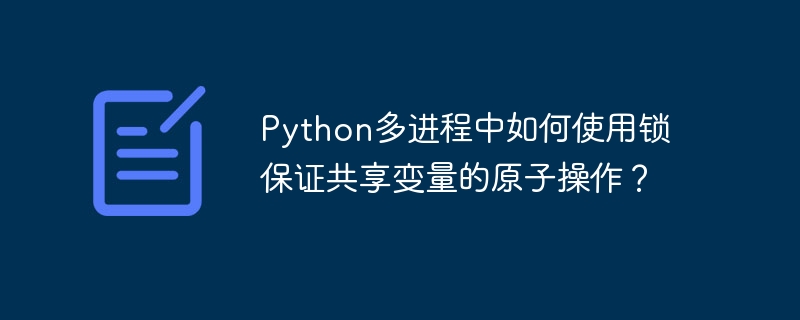Python多进程中如何使用锁保证共享变量的原子操作?

分享多进程操作共享变量的原子操作
在 python 多进程处理中,协调多个进程同时访问共享变量要保持原子性十分关键。为了解决这个问题,我们可以使用 concurrent.futures 模块中的 lock 对象。
1. 创建 manager 和 lock
我们首先创建一个 manager 对象,它允许多个进程共享数据。然后,我们创建一个 lock 对象,它将用于保护对共享变量的访问。
2. 使用锁进行原子操作
在进程中操作共享变量时,我们可以使用 with 语句将 lock 作为上下文管理器。这将确保每次共享变量被更改时只允许一个进程访问它,从而保持原子操作。
修正后的代码示例:
| from concurrent.futures import ProcessPoolExecutor | |
| import ctypes | |
| from multiprocessing import Manager, Lock | |
| import os | |
| # 创建 Manager 和 Lock | |
| manager = Manager() | |
| m = manager.Value(ctypes.c_int, 0) | |
| lock = manager.Lock() | |
| def calc_number(x: int, y: int, _m, total_tasks: int, _lock): | |
| # 模拟耗时任务函数 | |
| # 模拟耗时计算 | |
| res = x ** y | |
| # 用锁来保证原子操作 | |
| with _lock: | |
| _m.value += 1 | |
| current_value = _m.value | |
| # 当总任务数量和_m.value相等的时候, 通知第三方任务全部做完了 | |
| if current_value == total_tasks: | |
| print(True) | |
| print(f"m_value: {current_value}, p_id: {os.getpid()}, res: {res}") | |
| def main(): | |
| # 任务参数 | |
| t1 = (100, 200, 300, 400, 500, 600, 700, 800) | |
| t2 = (80, 70, 60, 50, 40, 30, 20, 10) | |
| len_t = len(t1) | |
| # 多进程执行任务 | |
| with ProcessPoolExecutor(max_workers=len_t) as executor: | |
| for x, y in zip(t1, t2): | |
| executor.submit(calc_number, x, y, m, len_t, lock) | |
| if __name__ == "__main__": | |
| main() |
这将确保多个进程每次只修改共享变量 m_value,从而实现原子操作。
以上就是Python多进程中如何使用锁保证共享变量的原子操作?的详细内容,更多请关注硕下网其它相关文章!
